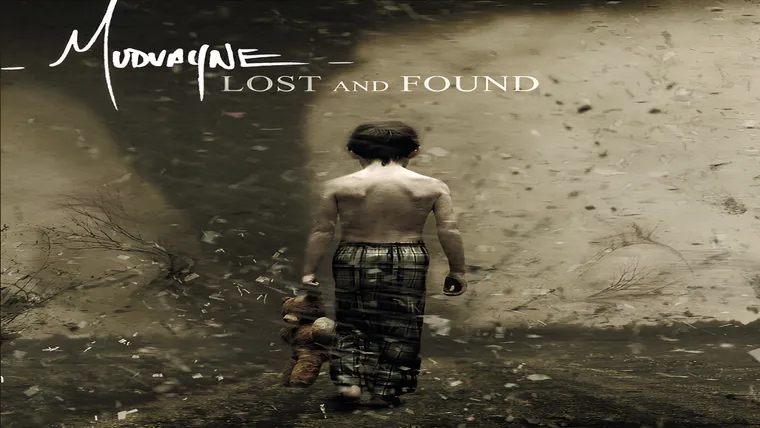
Released on April 12, 2005, Lost and Found marked a bold evolution for Mudvayne, a band already known for pushing boundaries within the alternative metal and nu-metal scenes. With their signature blend of complex rhythms, emotionally charged vocals, and progressive song structures, Lost and Found solidified Mudvayne’s position as a standout act in heavy music's rapidly changing landscape.
After rising to prominence with the chaos-driven intensity of L.D. 50 and the dark introspection of The End of All Things to Come, Mudvayne returned with an album that struck a balance between accessibility and technical prowess. What stands out most about Lost and Found is the band’s ability to harness their trademark aggression while incorporating a more refined, melodic edge. The result is an album that feels both raw and mature—heavy yet deeply emotive.
The anticipation surrounding Lost and Found was palpable, and fans were eager to see where Mudvayne would take their sound next. What they received was a record that didn’t abandon the band’s core identity but instead expanded on it. The album reflects the group’s evolution without sacrificing the primal energy that first drew listeners in.
“We wanted to write something honest and personal,” said vocalist Chad Gray in interviews. “This record is us, stripped back and wide open. It’s the most truthful thing we’ve done.”
A Sound That Sets Mudvayne Apart
Lost and Found opens with “Determined,” a ferocious anthem that sets the tone for the album with its blistering pace and shouted defiance. It’s a statement of intent—aggressive and unrelenting, yet surgically precise. The band’s ability to balance groove-laden riffs with complex time signatures shines from the outset, reminding fans that Mudvayne remains rooted in the unconventional.
As the album unfolds, tracks like “Pushing Through” and “TV Radio” demonstrate the group’s commitment to experimentation. While undeniably heavy, these songs introduce atmospheric textures and lyrical introspection that offer a contrast to the album’s more direct assaults. Guitarist Greg Tribbett delivers both crushing riffs and haunting melodic lines, weaving through the rhythm section’s controlled chaos with skill and flair.
The record’s breakout single, “Happy?”, is a perfect microcosm of Mudvayne’s sound at this stage in their career—emotionally raw, structurally tight, and explosively cathartic. Its blend of soaring choruses and aggressive verses highlights Chad Gray’s dynamic vocal range, moving seamlessly from guttural roars to vulnerable melodies. The song remains one of the band’s most enduring and recognizable tracks.
Emotion, Intensity, and Lyrical Depth
Lost and Found is more than just a showcase of musical skill—it’s a deeply emotional journey. Songs like “Fall Into Sleep” and “Choices” peel back layers of internal struggle, identity, and existential weight. Rather than relying solely on aggression, the album reveals a band grappling with inner demons, making the music feel intensely personal.
“Forget to Remember,” one of the album’s most poignant moments, offers a haunting melody underscored by rhythmic precision and lyrical honesty. It's a track that emphasizes vulnerability without losing its edge, and its inclusion in the Saw II soundtrack only cemented its dark, cinematic feel. The juxtaposition of heaviness and reflection gives the album a unique identity among its peers.
Even the closing track, “Pulling the String,” showcases a more subdued, almost sorrowful tone—proof that Mudvayne is just as effective when dialing back the intensity to let emotion take the lead. The album’s dynamic range allows listeners to feel both empowered and introspective, often within the same song.
Rhythmic Power and Technical Precision
At the heart of Lost and Found lies an extraordinary rhythm section. Bassist Ryan Martinie continues to deliver jaw-dropping performances, fusing funk-inspired grooves with jazz-like fluidity. His playing on tracks like “Choices” and “IMN” is both adventurous and integral, pushing Mudvayne far beyond standard metal fare.
Drummer Matt McDonough also remains a powerhouse of intricate rhythms and precise tempo changes. His drumming is essential to the band’s identity, often shifting the emotional landscape of a track with subtlety or explosiveness as needed. Whether executing polyrhythmic breakdowns or more straightforward backbeats, his performance is consistently compelling.
Together, the instrumental section forms a backbone that allows the band to explore a wide range of textures and themes while maintaining a high level of technical precision.
An Album That Captures Mudvayne’s Essence
Ultimately, Lost and Found represents a turning point in Mudvayne’s discography—a moment where complexity and accessibility intersect. It’s an album that embraces the heaviness and chaos that defined their early years while embracing more melodic, song-oriented structures. This duality is what makes the record so engaging.
Whether you’re drawn to the infectious hooks of “Happy?”, the crushing power of “Determined,” or the haunting introspection of “Forget to Remember,” Lost and Found offers something for every kind of metal listener. It’s a record that doesn’t compromise but evolves—holding onto what made Mudvayne unique while embracing new possibilities.
Final Verdict: 9/10
Standout Tracks:
- Happy?
- Forget to Remember
- Determined
- Fall Into Sleep
- Choices
Lost and Found is a bold and emotionally resonant chapter in Mudvayne’s legacy. With its blend of technical musicianship, lyrical depth, and raw power, it remains one of the most compelling alt-metal albums of the 2000s—a must-listen for fans of heavy music that dares to be both brutal and beautiful.
Until next time, play it loud, friends!

